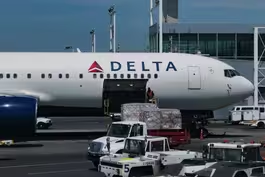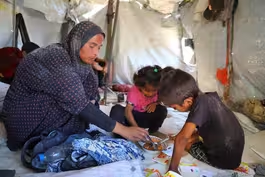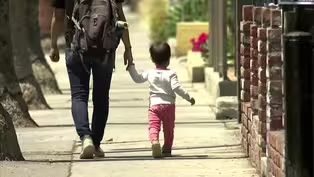
August 3, 2025 - PBS News Weekend full episode
8/3/2025 | 26m 45sVideo has Closed Captions
August 3, 2025 - PBS News Weekend full episode
August 3, 2025 - PBS News Weekend full episode
Problems playing video? | Closed Captioning Feedback
Problems playing video? | Closed Captioning Feedback
Major corporate funding for the PBS News Hour is provided by BDO, BNSF, Consumer Cellular, American Cruise Lines, and Raymond James. Funding for the PBS NewsHour Weekend is provided by...

August 3, 2025 - PBS News Weekend full episode
8/3/2025 | 26m 45sVideo has Closed Captions
August 3, 2025 - PBS News Weekend full episode
Problems playing video? | Closed Captioning Feedback
How to Watch PBS News Hour
PBS News Hour is available to stream on pbs.org and the free PBS App, available on iPhone, Apple TV, Android TV, Android smartphones, Amazon Fire TV, Amazon Fire Tablet, Roku, Samsung Smart TV, and Vizio.
Providing Support for PBS.org
Learn Moreabout PBS online sponsorshipALI ROGIN: Tonight on PBS News, Weekend aid groups on the ground inside Gaza say food and medicine trickling into the territory is not enough to prevent more Palestinians from dying from hunger.
Then, we explore a major U.S. airlines decision to use AI technology to help set ticket prices.
And celebrating the power of community through a nearly 50-year-old network of social clubs just for women named Lois.
WOMAN: I know that our Lois's are aging and if you're a Lois out there and you're seeing this, please come join us.
(BREAK) ALI ROGIN: Good evening.
I'm Ali Rogin.
John Yang is away.
Today marks one week since Israel began daily 10-hour tactical pauses of fighting in Gaza City, Deir al-Balah and Muwasi to allow more urgently needed aid into the territory.
But humanitarian groups say supplies are only trickling in and the violence continues.
The Palestinian Red Crescent accused Israel of killing one of its staff members today after shelling its office in Gaza.
Israel says it's investigating the claim.
Across the rest of the enclave.
At least 40 people were killed today by Israeli gunfire and airstrikes, according to local health authorities.
Many of them were reported to be seeking aid as the hunger crisis worsens.
Starvation and malnutrition claimed six more lives in the last day, according to the Gazan Health Ministry.
Earlier, I spoke with Olga Cherevko, spokesperson for the United Nations Office for the Coordination of Humanitarian affairs in Gaza.
I asked her what she's been seeing.
OLGA CHEREVKO, Spokesperson, Office of the Coordination of Humanitarian Affairs: The situation in terms of starvation crisis and the level of hunger here has reached unprecedented levels.
And it's now very visible and very obvious to the eye.
So the whole world has now seen these horrifying pictures of children, of adults who are obviously starving.
And the fact that it is now manifesting itself in people's bodies means that it has been happening over all these months that we've said that there is a crisis and it should be and it must be addressed immediately.
ALI ROGIN: We're seeing the images and the videos.
You are on the ground.
You are, you have relationships, friendships with the folks there.
The people that you see on regular basis, can you tell us about how they're doing?
OLGA CHEREVKO: Every time I see my friends and I or every time I don't see them for a few days and then they come in and I see them, it's really shocking how much thinner they are getting.
And this is really everywhere I look.
The gaunt faces, the kind of light that has gone out of people's eyes.
It's really something that is very common these days.
ALI ROGIN: Israel began tactical pauses in fighting in parts of Gaza.
They say it's to facilitate more aid coming in.
What has been your experience of those pauses on the ground and is more food being let in and is it enough?
OLGA CHEREVKO: Operationally so far we have seen little change.
While there is a slight increase in what is entering in terms of food, medicines and nutritional supplies and things that are allowed to enter, there is still not enough of aid entering and the conditions on the ground are such that they do not allow us to use our community based mechanisms to identify people's vulnerabilities and to distribute the aid to those who need it most.
And our convoys continue to face a lot of constraints and impediments.
They still take many, many hours to complete.
I was on a few missions last week and they were anywhere between 12 and 16 hours, which is still extremely inefficient given that it takes only a couple of hours to load the trucks with the aids.
ALI ROGIN: All of the impediments that you have mentioned to disperse the aid, what needs to change and whose responsibility is it?
OLGA CHEREVKO: Well, there are several things that need to happen.
One, there still needs to be much more aid entering.
There needs to be lifting of the restrictions on the items that are prohibited.
For example, things like shelter are not allowed.
So for over 150 days, actually we've had no shelter supplies entering.
And this is making the situation even worse because we have people sleeping in the streets.
We have hygiene conditions that are unimaginable.
And this is all contributing to the overall crisis.
Much more aid needs to be entering in terms of food and medicine.
Our hospitals are overwhelmed.
The healthcare system is barely functioning.
Some hospitals are operating in 200 or 300 percent capacity, again with patients in the hallways or in the parking lot.
And all the medicine that comes in is immediately allocated.
So they cannot have a sustainable operation in any way.
And then another thing that has to happen is the restoration of law and order and public safety.
Because with the breakdown of complete disintegration of law and order and this very erratic and inconsistent flow of aid into Gaza, the conditions that have been created have contributed to a lack of confidence of the communities themselves that the aid will reach them.
So they take it into their hands to make sure that they get something, because if they don't, they believe that they will not get anything.
A couple of days ago I was on a mission where were driving on and I saw an elderly nun on the side of the road kneeling down, scooping up handfuls of lentils that had spilled on the ground and putting them in his T-shirt.
And this is clearly the only thing that he can think of to feed himself and his family.
And this is just one of many examples of vulnerable people here.
ALI ROGIN: Olga Cherevko with the United Nations.
Thank you so much.
OLGA CHEREVKO: Thanks so much for having me.
ALI ROGIN: In today's other news, Russia and Ukraine traded drone and missile strikes.
A Ukrainian attack set a Russian oil depot ablaze.
Russia says more than 120 firefighters are fighting the fire and that nearby Sochi airport temporarily suspended flights.
Meanwhile, a Russian missile hit a residential area in southern Ukraine, injuring seven people.
Ukrainian President Volodymyr Zelenskyy announced on X that Ukraine and Russia have agreed to exchange 1,200 prisoners.
The news comes as Ukraine's anti-corruption agencies say they've uncovered a major bribery scheme.
They say it involves a lawmaker and at least three other people who were taking kickbacks on overpriced drone contracts.
The Senate called it quit Saturday night and left Washington for the summer without advancing dozens of President Donald Trump's nominations.
Republicans were working on a deal with Democrats to reverse some spending cuts in exchange for approving a large tranche of the less cost controversial nominees.
Mr. Trump had been pressuring Republicans for weeks to cancel the August recess and keep working.
But he reversed course last night, posting on social media that Democratic Minority Leader Chuck Schumer could go to hell and telling Republicans to go home.
Republicans warn that when they come back, they may try to change the Senate's rules to speed up confirmations.
And an update to a story we've reported on the Smithsonian has clarified that the Trump administration did not ask them to remove mentions of the president's impeachment history from an exhibit.
Last month's removal of a label referring to Mr. Trump's two impeachments from a display at the National Museum of American History prompted concerns about the institution whitewashing U.S. History to appease the president.
The museum says the placard did not meet its standards in appearance and that the updated presentation will include President Trump in the coming weeks.
Jack Smith, the man once charged with investigating President Donald Trump, is now under investigation himself.
The U.S. Office of the Special Counsel confirmed the unusual move on Saturday, saying that it's looking into claims that Smith acted politically.
Smith was appointed in 2022 to investigate Donald Trump's alleged mishandling of classified information and attempts to overturn the 2020 presidential election.
Smith resigned shortly before President Trump's second inauguration, And Pope Leo rode in on the Popemobile to lead a mass on the outskirts of Rome for hundreds of thousands of enthusiastic young Catholics, he said, the gathering of young people is a sign that a different world is possible, where conflicts can be resolved with dialogue, not weapons.
The mass was part of a festive week long series of events for young pilgrims who flooded the city to pray and party.
Still to come on PBS News Weekend, how Delta Air Lines is leaning into AI to help set ticket prices and social clubs comprised of people who all go by the same name.
(BREAK) ALI ROGIN: The next time you go online to purchase an airline ticket, there's a chance that the price you see was influenced by artificial intelligence.
Delta Air Lines is the first major carrier to begin to use AI technology to set ticket fares.
It's the latest development in an industry that's been experimenting with different ways to adjust ticket prices in real time.
Earlier, I spoke with David Sheperdson, who covers transportation for Reuters.
David Sheperdson covers transportation for Reuters.
David, thank you so much for being here.
So how is Delta using this predictive AI and what sort of data are they incorporating into these price models?
DAVID SHEPARDSON, Reuters: They're basically viewing AI as a super analyst, right?
So if you back up 30 years ago, the airline started doing this dynamic pricing, right?
So trying to adjust pricing based on fuel costs, demand, seasonal factors and so on.
And so you're talking about tens of millions of airline prices in real time, that they want to basically absorb enormous amount of data to make those changes, whereas maybe in the old days analyst with a pen and pencil and calculate trying to figure this out.
So it's about trying to move faster in the market versus maybe a little lag.
ALI ROGIN: And how individualized does this system allow the airline to get?
In other words, are they in a position where they can start setting different prices person to person?
DAVID SHEPARDSON: So Delta says no, Delta says flatly, we do not use any sort of pricing by individuals.
And then one of the main arguments they make is you can go to delta.com.
You don't have to log in, put your frequent flyer number in to get the price, and so you can get the same price whether you're logged in or not.
Now, that said, certainly the ability exists for all sorts of retailers to use, you know, data, you know, the digital footprints we all leave behind to target pricing example that a couple of members of Congress made last week was if someone went, looked at an obituary, right, and then went to an airline pricing website, would they be more likely to pay more money?
Because presumably they were looking at our obituary of a family friend or so on?
So, I definitely think the concern is real.
And within the lack of any sort of legislation from Congress or real safeguards, we have to go on the word of airlines and others that they're not going to take that step.
ALI ROGIN: Right.
So speaking of guardrails, I mean, are there any?
DAVID SHEPARDSON: There's the broad sort of FTC, no deceptive practices, right?
And so now the Delta's out there saying, we're not doing it.
You know, you could make the argument, but in terms of specific rules, sort of across the internet, across retail, there aren't.
And we certainly know there are examples in the past of other big companies using AI or trying to find ways to target specific consumers to set different prices.
ALI ROGIN: What is in it for these airlines?
What do they get out of this?
And is this becoming the new industry norm?
Are other major carriers following suit?
DAVID SHEPARDSON: So right now, the answer is no.
So American Airlines CEO Robert Eisen last week was very strong in saying, you know, not referring to Delta specifically, but the idea of AI is bait and switch and that American will never do that.
This would cause consumers to lose trust.
But the reality is that's certainly a possibility.
Airlines are always trying to find ways to get more revenue out of consumers by requiring you to pay for your seat or for upgrades or try to pitch you on more perks.
And that is a real question, right?
Can airlines, maybe beyond just the base ticket price, use your willingness to pay for some of these, you know, ancillary fees?
Could they use AI, do that?
And so that kind of goes back to this idea of how much regulations, how many guardrails there are.
But I do think just the idea has caused a firestorm of concern.
And I do think that's going to give the industry some level of trepidation before, do we want to go down that road, you know, given, you know, how much anger there might be, especially if you or I really get the same ticket and we're shown different prices.
For the average consumer who's not a travel nerd, it's hard to know what should I pay?
You know, what's the right price?
How much is going to change tomorrow, the next day?
ALI ROGIN: And is it your understanding that if a consumer is going on and their price has been set by AI, are they going to know that?
Are they going to know that it's different than dynamic pricing or something else?
DAVID SHEPARDSON: No.
No, I don't think so.
And so it's more about the fact that, hey, there's a crisis in the Middle East, right?
Oil prices just went up.
And so can I maybe more quickly react in real time and absorb all this data faster, or can they see that, hey, there's a big spike in travel demand, let's change the prices now.
And maybe in the past it might take them a little longer.
Delta says it's going to help both ways.
Maybe it reduces prices in some circumstances as well if demand's slower than they thought.
ALI ROGIN: David Sheperdson with Reuters, thanks so much.
DAVID SHEPARDSON: Thank you.
ALI ROGIN: As the Trump administration reimagines public health through its Make America Healthy Again Movement, a new study paints a stark picture of the challenges facing this nation's kids.
American children's health has significantly worsened across several key indicators since 2007, according to a recent study published in JAMA.
I recently spoke to Dr. Christopher Forrest, a pediatrician at the Children's Hospital of Philadelphia and one of the study's lead authors.
Dr. Forrest, thank you so much for joining us.
I want to read some top line numbers from your study.
A child was 15 to 20 percent likelier to develop a chronic condition in 2023 than in 2011.
Obesity rates rose from 17 to 20 percent among children between 2007 and 2023.
And rates of depression, anxiety, sleep apnea and autism have all increased.
What is the significance of children's health deteriorating across these metrics and more of them?
DR. CHRISTOPHER FORREST, Children's Hospital of Philadelphia: Our study actually evaluated 170 different health statistics.
Death rates of disease, distress.
And the significance is that across all of those indicators.
There's been a decline in children's health over the last two decades.
That speaks to a generalized decline in the developmental ecosystem where kids are being raised, where they grow and where they live.
ALI ROGIN: What do we know about why this is happening?
CHRISTOPHER FORREST: So that is the big question, and it's a complex answer.
There is no single factor that's causing this generalized deterioration.
People like to point out that the food environment is not healthy or the kids are spending more time on social media.
But that's just the proximate set of causes.
There are also environmental causes that are important.
What's happening to families?
Families are experiencing a lot of stress.
What's happening in schools?
What's happening with school start time?
What's happening with the climate changes that's actually now having impacts on both acute and chronic conditions?
And then even deeper than that is the political economy of our nation that allows one in seven children to live in poverty.
And also the cultural values that don't place children at the forefront of what we view as important to our society.
ALI ROGIN: How do these statistics in the United States stack up against other wealthy first world countries?
CHRISTOPHER FORREST: So we compare the United States death rates specifically for children less than 20 years of age to 18 countries, largely in Europe and Asia.
These are other high income nations.
And in the 1960s and the 1970s, the death rates were exactly the same.
But about 1980, we started to see the death rates decline more rapidly in those comparator countries versus the United States.
And today children in the U.S. have 80 percent higher death rates than children in other countries, both babies as well as children ages 1 to 19.
ALI ROGIN: The results of your study reflect some of the same problems that Health and Human Services Secretary Robert F. Kennedy, Jr. has been talking about that his Make America Healthy Again movement has been highlighting.
What do you make of the approach so far that this HHS and the Trump administration writ large has been taking to children's health?
CHRISTOPHER FORREST: In May of this year, the administration published a report that characterized children's health as in crisis.
I completely agree with that diagnosis.
Children's health has been declining over the last 20 years.
So the fact that the administration came out with that very strong statement that we need to better understand why children's health is in decline, I felt was a welcome message.
However, the analysis, at least the analysis done so far, has been very superficial.
As I mentioned, it's not all about the food environment.
It's not all about the chemicals that kids may be exposed to.
There's much deeper things going on in our society in terms of how families are struggling to raise kids.
Our neighborhoods are sort of disengaging from raising kids communally and what's happening in our political economy.
So I welcome subsequent reports from the administration.
I hope they look at our article and begin to dig more deeply as to what are some of the deep causes of children's declining health.
ALI ROGIN: Dr. Christopher Forrest of Children's Hospital of Philadelphia, thank you so much for breaking this down for us.
CHRISTOPHER FORREST: My pleasure.
Thanks for having me.
ALI ROGIN: In 2023, the U.S.
Surgeon General warned of an epidemic of loneliness in this country, saying that increasing social isolation is threatening Americans health and well-being.
For some women, there's a special club that offers immediate social connection.
A place where everyone knows your name, as they say.
Special correspondent Megan Thompson has our report, part of her upcoming documentary on the Lois Club.
MEGAN THOMPSON (voice-over): The group of special visitors clambered off their motorcoach and onto wading trolleys at the Kansas City Zoo and Aquarium.
It's home to some 10,000 animals.
But this group was here to see just one.
WOMAN: Lois is 47 years old.
She's one of our nine African elephants.
MEGAN THOMPSON (voice-over): Why all the interest in an elephant named Lois?
Because these women are all named Lois too.
LOIS HILGER: I am Lois Hilger.
LOIS STEVENSON: Lois Stevenson.
LOIS SEDLING: Lois Sedling.
LOIS CHANG: My name is Lois Chang.
MEGAN THOMPSON (voice-over): This is the Lois Club and they've come to Kansas City from all over the country for their four day national convention.
The visit to Lois the Elephant was just one stop.
The Lois Club has been around since 1979 when as the story goes to two Loises in Minnesota met for lunch and thought it would be fun to do it again and invite more Lois's.
The Lois Club was born.
LOIS STEVENSON: It just seems that as soon as you meet a Lois, right away you got a friend.
LOIS MILLER: There are not only Lois clubs in the United States, there are Lois Clubs in Canada.
There are Lois Clubs in Europe and New Zealand.
MEGAN THOMPSON (voice-over): Meeting for lunch is still a main activity.
Local clubs across the country gather every few months to nosh, gab and sing.
LOIS OUTCELT: Are you ready to sing?
We do have fun, don't we?
LOIS DUNN: I love the luncheon.
I love us girls traveling to the luncheon together.
It's just a good time.
LOIS GULOTTA: I think that the older you get, the harder it is to meet people, much less even make friends with people.
Who knew that just having the same name as somebody else and you would have an instant bond?
MEGAN THOMPSON (voice-over): Thing they bond over.
LOIS STEVENSON: We all have had the same experiences with having our little short name totally messed up.
WOMAN: Well, I've been called Louis by many people.
WOMAN: Louise.
LOIS STEVENSON: Louise.
WOMAN: Laos.
MEGAN THOMPSON: Louse.
LOIS GULOTTA: I have gotten a receipt with my name spelled L-O-S-E.
Lose.
Really?
MEGAN THOMPSON (voice-over): There's even a tune about it called the Lois fight song.
The name is thought to be of Greek origin and means most desirable.
It also appears in the Bible.
LOIS STEVENSON: Lois is the grandmother of Timothy.
MEGAN THOMPSON (voice-over): In the U.S. the name peaked in popularity in the late 1920s when more than 10,000 babies were named Lois each year.
Today it's just over 100.
The Facebook group has more than 900 members, but participation in the lunches and conventions is on the decline.
LOIS PEDOWITZ: I know that our Lois's are aging and if you're a Lois out there and you're seeing this, please come join us.
MEGAN THOMPSON (voice-over): The Lois's recruit new members wherever they can.
LOIS MORRIS: I talked to a gentleman from another tour and his wife's name is Lois.
I interest you in our Lois group.
We're on our annual convention and each year we pick a different location.
Hope that you're with us next year.
WOMAN: See how excited we get when we find another Lois.
WOMAN: Our last Lois has arrived.
MEGAN THOMPSON (voice-over): The Loises were thrilled about a new member who came to this year's convention in Kansas City, 27 year old Lois Chang of San Francisco.
LOISCHANG: Several of them have asked if I'm coming back.
A few of them have told me to bring other young Lois's.
AMIE CANTARELLA: We have file folders for everything.
MEGAN THOMPSON (voice-over): Amie Cantarella meticulously plans the annual conventions.
AMIE CANTARELLA: The different events that we do, where we're going.
I am a doll, a daughter of a Lois.
MEGAN THOMPSON (voice-over): Cantarella and her mother Lois Stevenson of Glen Ellen, Illinois will often travel in advance to the location voted on by the Lois's to scout hotels and transportation and make sure the activities will be accessible.
LOIS THOMSON: I was with the Loises out of the zoo.
MEGAN THOMPSON (voice-over): This year, Cantarella had help planning from Lois Thomson, a Kansas City native and longtime fan of Lois the Elephant, who it turns out, has a special talent.
LOIS THOMSON: And I got to pick the colors that I wanted, so Lois got to paint this for me.
And then Lois also gets a little radical and she sprays.
MEGAN THOMPSON (voice-over): For its visit, the club brought Lois a treat of watermelon, which she gobbled up whole.
Lois Stevenson had the honor of inducting the elephant into the club.
LOIS STEVENSON: We, the undersigned Loises, induct you, Lois T. Elephant into the International Lois Club.
MEGAN THOMPSON (voice-over): Next year, the Loises are off to Seattle and Vancouver.
For PBS News Weekend, I'm Megan Thompson in Kansas City, Missouri.
ALI ROGIN: A special thanks to all the Lois's watching.
That's our program for tonight.
I'm Ali Rogin.
For all of my colleagues, thanks for joining us.
Have a good week.
How Delta is leaning into AI to help set air ticket prices
Video has Closed Captions
Clip: 8/3/2025 | 4m 39s | What to know about Delta’s use of AI to adjust ticket prices in real time (4m 39s)
News Wrap: Ukraine and Russia agree to exchange 1,200 POWs
Video has Closed Captions
Clip: 8/3/2025 | 3m 11s | News Wrap: Ukraine, Russia agree to exchange 1,200 prisoners as aerial strikes continue (3m 11s)
UN warns trickle of Gaza aid not enough to prevent deaths
Video has Closed Captions
Clip: 8/3/2025 | 5m 37s | Supplies trickling into Gaza not enough to prevent Palestinian deaths, UN office warns (5m 37s)
Why American children are less healthy now than years ago
Video has Closed Captions
Clip: 8/3/2025 | 4m 31s | Why American children are less healthy now than nearly two decades ago (4m 31s)
Women find connection and combat loneliness in the Lois Club
Video has Closed Captions
Clip: 8/3/2025 | 5m 54s | Women find connection in the Lois Club, where everyone knows your name (5m 54s)
Providing Support for PBS.org
Learn Moreabout PBS online sponsorshipSupport for PBS provided by:
Major corporate funding for the PBS News Hour is provided by BDO, BNSF, Consumer Cellular, American Cruise Lines, and Raymond James. Funding for the PBS NewsHour Weekend is provided by...
















